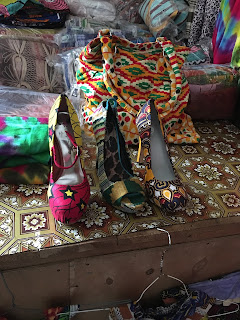 |
| Young girl practices carrying a stuffed animal on her back, the same way that women carry children on their back. |
Throughout my summer, I’ve been meeting with stakeholders from local NGOs, women's groups, and other members of the community to understand some of the problems that women in Guinea are facing, and they’ve shared a long list: female circumcision (also known as genital cutting/mutilation), divorce, lack of jobs, early marriage, and the list goes on. As I started my doctoral research on child marriage in an African context, I wanted to take a step back and challenge myself to be open, not only to look for an answer to the questions that I have but to seek out the questions I didn't even think to ask.
I interviewed one woman - let's call her Kadijah* - who shared her current life hardships as a victim of what she called forced marriage. Though she was married at the age of 25, an age in Guinean culture, she shared, where she could no longer say she wasn't ready to marry, her family had made the arrangements. The marriage resulted in her postponing her university education - she was proud to share how she was able to complete it - but now, she is unemployed, as she could not find a job, and stays at home to raise her young children. Although she believes her husband could be a good partner, she experiences maltreatment from her live-in mother-in-law, which makes her current marital situation extremely difficult and discouraging.
There was another woman - let's call her Mariama* - who was married off at the age of 16. Now, her story was one of great luck, as she described; her family arranged a marriage and more than two decades later, she considers it a success. She has several kids, all of whom are doing well, all of whom have had more opportunities than she has, and she had more than her mother. She’s happy in her marriage - describes her husband as a good man - and although, as I later learned, she is the second of two wives, her education, intellect, and courage have helped her secure, in her words, "a good marriage."
These are just two snapshots of stories women have been generous enough to share with me, glimpses into parts of their lives that - many described - they'd never talked about before. Unfortunately, most of the stories so far have been more like Kadijah's, or, even worse, have been laced with stories of repeated verbal and physical abuse. Even just to think about the intimate details some have shared is heartbreaking, and yet, these are the experiences that these women, and hundreds like them, live every day.
There have been two positive aspects that have emerged repeatedly in the first handful of interviews, which I believe are worth highlighting here. First, the women that I've interviewed thus far have looked at their children as their successes, regardless of the experiences of their marriages. They've shared that this is related to cultural norms and expectations: a young woman is supposed to marry and produce children. Many illustrated how their children's lives are somehow better than their own, whether they married at a later age, or had the opportunity to complete schooling regardless of gender. Second, the women I have interviewed thus far have shown a lot of strength. Only one woman cried briefly during her interview, despite the various horrific tales that left me and my assistant teary-eyed. A few have also become advocates, working for local organizations where they are able to help educate other women about their rights or health.
I can't put into words what this experience has been like, starting to delve into this private space of thoughts and experiences of women in this community. And I can't explain how incredibly fortunate I feel that these women have adopted me into their lives, that they trust me to learn from their pasts and to share my interpretation of these messages along. And although my time in Guinea for this summer has ended, it has become increasingly clear that my relationship with this country, and with some of the incredible women I've been fortunate to meet here, is only just beginning.
*Names have been changed to protect the identity of the women who generously volunteered their time to participate in multiple interviews. I am truly grateful.
*Names have been changed to protect the identity of the women who generously volunteered their time to participate in multiple interviews. I am truly grateful.

















































